You searched for: googleseo霸屏霸屏靠谱【TG飞机:@bapingseo】谷歌seo指南怎么用seo顾问【TG电报:@bapingseo】帕勞google留痕收錄【Telegram:@bapingseo】1399彩票net网站jc聚彩彩票平台官方?2Ig95q/h0MS4j.html
<< Previous | Displaying results 221-230 of 354 for "googleseo霸屏霸屏靠谱【TG飞机:@bapingseo】谷歌seo指南怎么用seo顾问【TG电报:@bapingseo】帕勞google留痕收錄【Telegram:@bapingseo】1399彩票net网站jc聚彩彩票平台官方?2Ig95q/h0MS4j.html" | Next >>
-
Gideon Boissevain
ID CardGideon was known affectionately as "Gi" by his family and friends. His parents were descended from the Huguenots, French Protestants who came to the Netherlands in the 16th and 17th centuries. Gi had two brothers and two sisters, and his father worked in the insurance business. 1933-39: Gi had a large circle of friends, both Christians and Jews, and after school they all liked to get together. He and his friends enjoyed taking bike trips, having parties, and playing records. In the mid-1930s his parents…

-
Dismissal letter
DocumentDuring the interwar period Dr. Susanne Engelmann served as the principal of a large public high school for girls in Berlin. This letter notified her of her dismissal, as a "non-Aryan," from her teaching position. The dismissal was in compliance with the Civil Service Law of April 7, 1933. On April 7, the German government issued the Law for the Restoration of the Professional Civil Service (Gesetz zur Wiederherstellung des Berufsbeamtentums), which excluded Jews and political opponents from all civil…
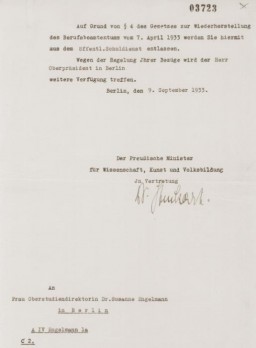
-
German military court trial of French resistance members
FilmFrance signed an armistice with Germany on June 22, 1940, recognizing the right of German authorities to oversee the French administration. Further, German military authorities held jurisdiction over matters of internal security. In this footage, a German military court in Paris tries French citizens charged with resisting measures of the military occupation. Despite harsh military justice, the Germans could not quell opposition in France, and resistance activities would reach a peak during the Allied…

-
German forces in Italy surrender to the Allies
FilmAllied forces occupied most of Germany by the end of April 1945. German forces fighting in Italy were the first to surrender unconditionally to the Allies. Representatives of the German command in Italy signed the surrender on April 29, and it became effective on May 2, 1945. Five days later, on May 7, 1945, Germany surrendered unconditionally to the western Allies, ending the war in Europe.
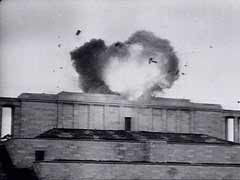
-
Japanese surrender
FilmWorld War II in the Pacific theater ended with the Japanese surrender on September 2, 1945. The surrender was signed in Tokyo Bay aboard the American battleship USS "Missouri." Foreign Minister Shigemitsu headed the Japanese delegation. General Douglas MacArthur accepted the surrender on behalf of the Allies. Admiral Nimitz signed for the US and Admiral Fraser for Britain. Representatives of all the Allied nations attended the signing.
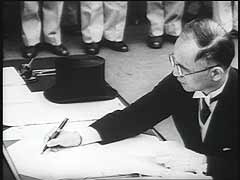
-
US veteran James Rose describes his impressions of Dachau upon liberation
Oral HistoryJames A. Rose, of Toledo, Ohio, was with the 42nd (Rainbow) Division.

-
The SS
ArticleThe SS (Schutzstaffel) was the elite guard of the Nazi regime and a virtual state within the Third Reich.
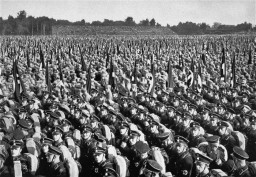
-
Bergen-Belsen: Key Dates
ArticleExplore a timeline of the history of the Bergen-Belsen camp in the Nazi camp system. Initially a POW camp, it became a concentration camp in 1943.
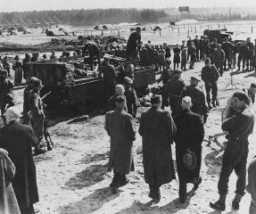
-
Nazi Rule
ArticleAfter they rose to power in 1933, Hitler and the Nazis eliminated democratic freedoms and took control of all aspects of public life in Germany. Learn more.
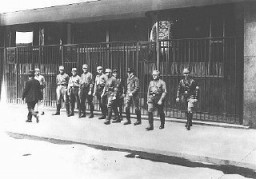
-
Kindertransport, 1938–40
ArticleKindertransport refers to a series of rescue efforts between 1938 and 1940 that brought thousands of refugee children to Great Britain from Nazi Germany.

